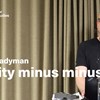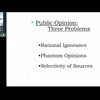games
Cooperation, structure and hierarchy in multiadaptive games
2011. Phys. Rev. E. 84:061148. Abstract Game-theoretical models where the rules of the game and the interaction structure both coevolves with the game dynamics —multiadaptive games—capture very flexible
Emergent hierarchical structures in multiadaptive games
2011. Phys. Rev. Lett. 106: 028702. We investigate a game-theoretic model of a social system where both the rules of the game and the interaction structure are shaped by the behavior of the agents. We ca
Learning by Imitation in Games: Theory, Field and Lab
Erik Mohlin, Oxford University We exploit a unique opportunity to study how a large population of players in the field learn to play a novel game which has a complicated and non-intuitive mixed strateg
The normality assumption in coordination games with flexible information acquisition
Journal of Economic Theory, vol. 203, 2022. Abstract Many economic models assume that random variables follow normal (Gaussian) distributions. Yet, real-world variables may be non-normally distributed.

Reality minus minus - James Ladyman, Professor of Philosophy
There is plenty of techno-optimistic takes on virtual worlds. They will offer us opportunity for new and exciting experiences, as real as reality, it is said. But what about the costs? In a talk from

James Fishkin: Is Deliberation an Antidote to Extreme Partisan Polarization?
James Fishkin: Is Deliberation an Antidote to Extreme Partisan Polarization? Reflections on “America in One Room” This talk is positioned at the intersectionof two literatures: partisan polarizatio
The Reverse Gender Gap in Ethnic Discrimination: Employer Stereotypes of Men and Women with Arabic Names
International Migration Review, s. 1-28. DOI: 10.1111/imre.12170 Abstract We examine differences in the intensity of employer stereotypes of men and women with Arabic names in Sweden by testing how much
POSTPONED. NEW DATE PENDING. James Fishkin: Democracy When the People Are Thinking: Applications of Deliberative Democracy
Postponed. New date pending. James Fishkin, Professor of Communication, Professor of Political Science (by courtesy) and Director of the Center for Deliberative Democracy, Stanford University. Abstract D
James Fishkin: Is Deliberation an Antidote to Extreme Partisan Polarization? Reflections on “America in One Room”
AbstractIs Deliberation an Antidote to Extreme Partisan Polarization? Reflections on “America in One Room” Register here to join the seminar This talk is positioned at the intersectionof two literatures
Are you offside in the healthcare game?
Seminar during "Digital Health Days". Digital Health Days 2014 are held at Stockholmsmässan in Älvsjö, on the 25th and 26th of August. Anders Ekholm, deputy director at the Institute for Futures Studies








